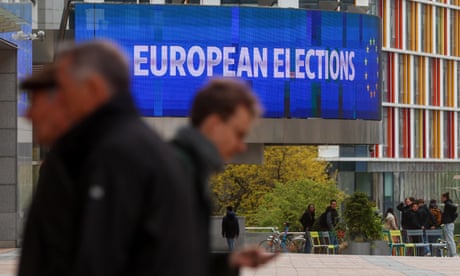
The starting gun has been fired on the next European parliamentary elections with more than 600 MEPs departing Strasbourg urged to use their “strength and patience” to fight the far right and disinformation and return a vote across the bloc for democracy.
There were flowers, tears and cheers on Thursday as Roberta Metsola, president of the European parliament, made her last address and MEPs raced back to their respective countries to launch a six-week campaign for re-election.
Emmanuel Macron, hundreds of miles away in Paris, was warning of “a risk our Europe could die” – a sentiment that reverberated around the plenary chamber in Strasbourg.
Holding a red carnation in her hand to mark the 50th anniversary of democracy in Portugal, Metsola said that “the symbolism of today is all the more significant”, wishing MEPs “strength, patience, and success” and urging them to “bring Europe” home.
Noting that 25 April was also Liberation day in Italy, the socialist MEP Achille Variati warned that the “kind of oppressions” seen in the “fascist period” were now “hiding around the corner” once again.
Philippe Lamberts, the outgoing MEP and Greens co-president, echoed Variati, saying that “dictatorships and authoritarian dangers are once again on the rise”, coming close to tears as he made a valedictory speech after 15 years in parliament.
Manfred Weber, leader of the European People’s party (EPP), a centre-right group of MEPs which is the largest in the parliament, urged voters not to be fooled by the extreme right when they go to the polls on 6-9 June.
“They call themselves nationalists. They tell people they love their country, but then we learn they are on the payroll of China or Russia. Don’t vote for them. You will not get strong, brave defenders of your interests, you will get ambassadors for Putin and Xi and that is not what Europe needs,” he said.
Many are deeply worried about the changes an emboldened far right could make to the EU agenda. “There is a nervousness, not excitement. People just want to get back home to hit the campaign trail,” said one MEP’s adviser.
The Green MEP Grace O’Sullivan, whose Ireland South constituency stretches from the tourist and fishing bases of Kerry to the cheese vales of Cork, said that unlike the last European elections in 2019 the Greens would not be able to rely on the youth vote.
She said: “Last time we had the climate activists, the Fridays for Future [movement spearheaded by Greta Thunberg]. We don’t have that this time.
“There is a much greater awareness of climate change but with the move towards the extreme right we are back into the territory where people are questioning climate change.”
Ahead of the elections there is also a race for the top jobs in Brussels with the centre-right EPP, as the largest group in the parliament, hoping to obtain a second term for the Christian Democrats’ Ursula von der Leyen as president of the European Commission.
But the roles of president of the European Council and the chief diplomat role – which is held by Spain’s Josep Borrell – are also up for grabs. The former Portuguese prime minister, António Costa, is considered a frontrunner for the former.
But Pedro Sánchez would also be a contender for the same role if he decides to quit as Spanish prime minister after his shock announcement on Wednesday night that he is considering resigning. He and Costa are from the Socialist group, which would take the second-most important role if returned as the second largest group in parliament.
Mette Frederiksen, the Danish prime minister, is also a potential candidate, while the list for chief diplomat runners is long, with pressure on member states to appoint someone from eastern or central Europe. Estonia’s Kaja Kallas is frequently mentioned for both jobs.